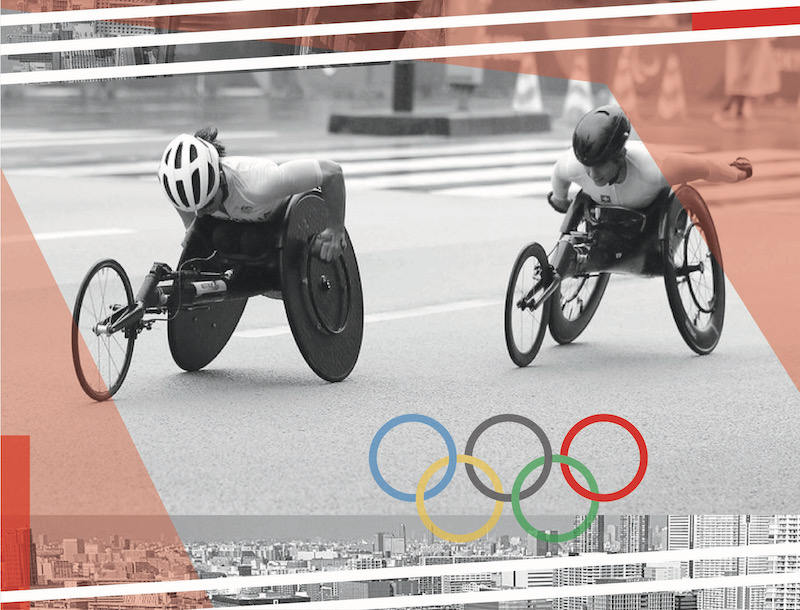
Prof David McGillivray
Chair in Event and Digital Cultures in the Centre for Culture, Sport & Events (CCSE) at University of the West of Scotland. David’s research focuses on major and mega sport events, with a focus on their social impact. His work in recent years has focused on disability sport events and human rights infringements in mega sport events.
Email: david.mcgillivray@uws.ac.uk
Twitter: @dgmcgillivray

Section 5: Politics of Sport
- Despite “Gender Equal Olympics,” focus still on what women are wearing
- The sacred space of the Olympics
- At Tokyo Games, athlete activism takes front row seat despite IOC’s attempts to silence athletes
- Forced hijab and female athletes in postrevolutionary Iran
- Pay equity and the Tokyo 2020 Olympics
- We want reform
- The revolt of the Black athlete continues
- The colonization of the athletic body
- Anti-Olympics activism
- Rooting for U.S. Olympians: Patriotism or polarization?
- The new kids on the block: Action sports at the Tokyo Olympic Games
- Black women and Tokyo 2020 games: a continued legacy of racial insensitivity and exclusion
- “A ceremony for television”: the Tokyo 2020 media ritual
- Softball’s field of Olympic dreams
- Equal remuneration for a Paralympian
- Is there space on the podium for us all?
- The Tokyo Paralympics as a platform for change? Falling well short of sport and media ‘opportunities for all’
- What social media outrage about Sha’Carri Richardson’s suspension could mean for the future of anti-doping policies
- Now you see them, now you don’t: Absent nations at Tokyo Paralympic Games
- Will #WeThe85 finally include #WeThe15 as a legacy of Tokyo 2020?
- WeThe15 shines a spotlight on disability activism
- Activism starts with representation: IPC Section 2.2 and the Paralympics as a platform for social justice
- In search of voice: behind the remarkable lack of protest at the Tokyo Paralympics
Like its Olympic counterpart, the 2020 Tokyo Paralympic Games took place largely behind closed doors with no spectators present to experience the world’s best para-athletes perform on the global stage. However, performing without vast numbers of spectators is unfortunately more common to para-athletes than to their Olympic compatriots. There is no Diamond League for para-athletes and far too few events benefit from the media coverage that elite level able bodied athletes take for granted. Outside of some World Championships and integrated events like the Commonwealth Games, the Paralympic Games remain one of the few opportunities for para-athletes to take their place in the media spotlight and shape their representation to a global audience. While the legacies of the Paralympic Games for host cities and countries is subject to much critique, this mega-spectacle does provide para-athletes representing their nation with the opportunity to become household names and – the theory goes – improve attitudes towards people with disabilities beyond the event itself. In this contribution, I focus on the UK context, with particular focus on Scotland to illustrate the continuing difficulties of translating rhetoric into reality in the sphere of disability and disability sport.
In the UK, Paralympics GB returned home from Tokyo with 124 medals, with 21 of these being won by Scottish para-athletes. Narratives of pride and inspiration were prevalent as the success of the country’s para-athletes was lauded by politicians, sport governing bodies and media commentators alike. However, post-Games a degree of caution was also expressed by those responsible for organising disability sport and representing the lives of people with disability more generally, which strikes at the heart of debates about the social impact of major sport events. Scottish Disability Sport, the governing body for many of the Scottish para-athletes who performed in Tokyo 2020, spoke after the event of the athletes’ wonderful personal achievements, their increased profile, and the positive effects of the Paralympic Games in inspiring people to consider taking up sport or physical activity. In a radio interview, SDS’s Chief Executive, Gavin MacLeod, confirmed that “the opportunities are greater than they’ve ever been before at the local level and there are pathways right up into international sport {…] in almost every sport now there is a pathway there and opportunities at a local level”.
However, recognition of the positive impact of the Paralympics also needs to be tempered with a degree of realism over the continuing inequities in sport participation for people with disabilities. Again, MacLeod talked of the Paralympic Games being “part of the solution to getting more disabled people involved in physical activity and sport”, because the Games provide people with disabilities with a visible confirmation that “people like them” can participate in high level sport. However, he also suggested that the incentive or inspiration provided by watching the Games on television is insufficient for many, instead arguing that there is a need for different interventions to help them become more physically active whether that’s local provision, 1-2-1 support, transport, or finance. In reality, some of the inequities that existed before the Paralympic Games remain, and many have been exacerbated as a result of the coronavirus pandemic, as recent research from Scotland suggests. For example, despite winning 21 medals and having an extremely successful Paralympic Games, in Scotland (like in other countries) there remains a need for more clubs, coaches, and volunteers to enable people with disabilities to access and enjoy sport and physical activity as close to their homes as possible. Physical and economic barriers associated with transport, equipment and (absence of) employment also persist despite the glow that accompanies national medal success.
While the para-athletes that millions of people in the UK watched break world records and accrue multiple gold medals in Tokyo deserve greater recognition, more needs to be done to translate short-term media spectacle effects into the sustained political will to invest in the sometimes mundane, yet vital, facilities and support services that people with disabilities require if they are to see sport and physical activity as an accessible and rewarding space to enter. In the UK Channel 4 has, quite rightly been lauded for its exceptional coverage of the Paralympic Games since 2012. This coverage generates new conversations about the capabilities of people with disability in homes around the country and in the public sphere. Yet, we know from past experience, that these conversations can quickly lose their efficacy if they only occur once every four years. In our research, Leveraging Disability Sport Events, we have argued that in order to exploit the opportunities presented by major parasport events, clear strategies and policies must be in place in the host environment, supported with resources that help deliver on rhetorical claims. Strengthening structures, networks, programmes and the labour force are crucial if the demonstration effect accruable from watching the Paralympic Games is to be translated into meaningful and sustainable actions that benefit club, recreational or casual participants.

